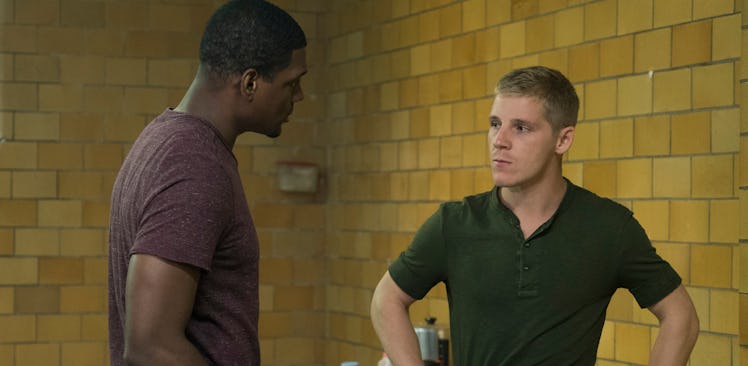
What Did Lewis Say Before He Died? 'The Punisher' Character Recited This War Poem
The 10th episode of The Punisher is a pretty major one. After so much time spent trying to figure out what is going on with Operation Cerberus and Agent Orange separately, the main characters of the new series (Frank Castle, Dinah Midani, Billy Russo, Lewis Wilson, and even Karen Page) finally all intersect during one incredibly stressful day at a hotel. Ultimately, "Virtue of the Viscous" ends in the death of one of the characters, but before he died he gave an epic speech. Here's the meaning of that poem Lewis recited before he died on The Punisher.
The climactic episode centers on Lewis' most daring terrorist attack yet. Up to this point, we've see Lewis grow increasingly frustrated and dangerously unhinged die to his post-traumatic stress disorder and inability to re-assimilate into society after his time in the army. As his anger gets worse, Lewis begins to get violent, first killing a fellow vet who lied about his battlefield experience, and then starting to bomb government buildings. He sent a letter to Karen Page announcing that he was performing these destructive acts because he feels disenfranchised by the government and specifically opposes anti-gun policies. When Page calls him out as a terrorist in her paper, Lewis makes a plan to kill both Page and a prominent anti-gun senator during an interview between the two at a hotel.
Lewis manages to infiltrate the security team (Billy Russo's privately owned company Anvil) by stealing a uniform, and when the Punisher messes up his plan to kill the senator and Page he grabs Page and takes her hostage, revealing that he has a bomb strapped to his chest. While he's holding Page in the hotel's kitchen, Lewis reveals a saying he learned in the army that he recites often. It's an excerpt from Rudyard Kipling's 1895 poem "The Young British Soldier."
Moments later, when the Punisher breaks into the kitchen and Page frees herself from Lewis, the young vet locks himself in a fridge and recites the rest of the poem before detonating his bomb and killing himself. You can read the entire poem on the Kipling Society's website. The segments that Lewis recite are as follows:
If your officer's dead and the sergeants look white,
Remember it's ruin to run from a fight:
So take open order, lie down, and sit tight,
And wait for supports like a soldier.
Wait, wait, wait like a soldier . . .
When you're wounded and left on Afghanistan's plains,
And the women come out to cut up what remains,
Jest roll to your rifle and blow out your brains
An' go to your Gawd like a soldier.
Go, go, go like a soldier,
Go, go, go like a soldier,
Go, go, go like a soldier,
So-oldier of the Queen!
The whole poem of "The Young British Soldier" serves more as an instruction to new recruits in the military than anything. In it, Kipling advises young soldiers on how to deal with multiple trials of military life, including cholera, bars, the sun, and even marriage. "The Young British Soldier" was released during the height of Rudyard Kipling's fame. The British author had just released the book that would go down as his most-well known pieces to this day, The Jungle Book, a year earlier. But unlike that fictional tale of a young boy raised in the jungle, most of Kipling's works were more similar to "The Young British Soldier," and he became known for his penchant for writing about soldiers at war.
The poem seems like a perfect choice for Lewis to recite. Obviously, the ending mirrors the suicide he was about to perform, but the fact that the full poem is just a long list of rules for soldiers also underlines how he lived his life. He couldn't handle living a civilian life free from the structure and code of the military, so he would recite that code over and over again.